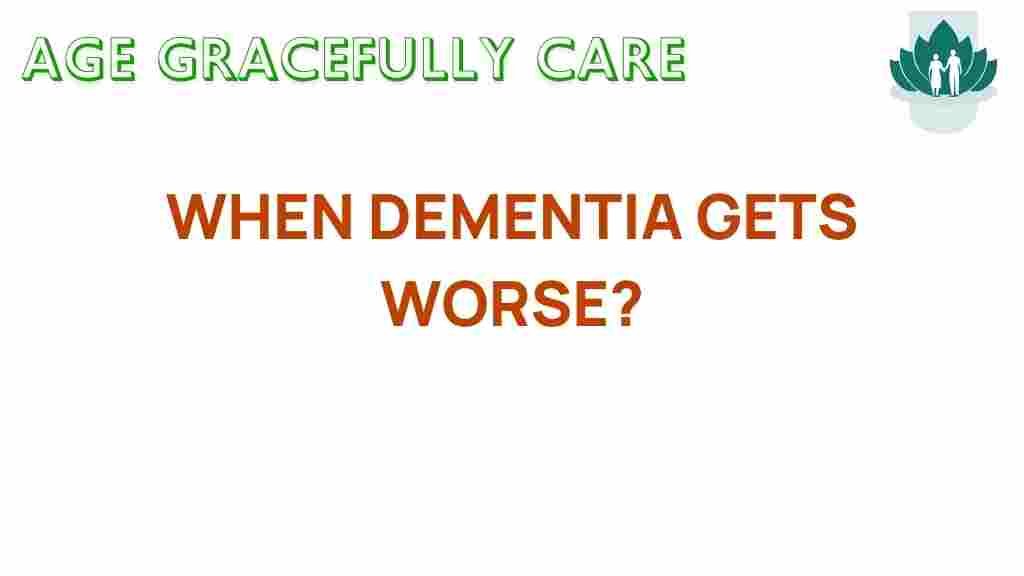Understanding the Turning Point: When Dementia Worsens
Dementia is a complex condition that affects millions of people worldwide. As cognitive decline progresses, understanding the turning point when symptoms worsen becomes crucial for caregivers, families, and individuals facing this challenging journey. This article will explore the various aspects of dementia, focusing on symptoms, treatment options, support systems, and the importance of awareness and diagnosis.
What is Dementia?
Dementia is an umbrella term used to describe a range of cognitive impairments, including difficulties with memory, thinking, and social abilities severe enough to interfere with daily life. It is not a specific disease but rather a combination of symptoms that can be caused by various underlying conditions. The most common type of dementia is Alzheimer’s disease, but other forms include vascular dementia, Lewy body dementia, and frontotemporal dementia.
Symptoms of Dementia
Recognizing the symptoms of dementia is essential for early diagnosis and management. Common symptoms include:
- Memory loss: Difficulty remembering recent events or conversations.
- Confusion: Disorientation regarding time and place.
- Difficulty with language: Trouble finding the right words or following conversations.
- Changes in mood and behavior: Increased anxiety, depression, or agitation.
- Impaired judgment: Poor decision-making or difficulty managing finances.
As dementia progresses, these symptoms may worsen, leading to more significant challenges for both individuals and their caregivers.
The Stages of Dementia and Cognitive Decline
Dementia typically progresses through several stages, each characterized by varying degrees of cognitive decline. Understanding these stages can help caregivers prepare for the changes that may occur.
- Early Stage: Individuals may be able to live independently but may experience mild memory loss and confusion.
- Moderate Stage: Symptoms become more pronounced, leading to difficulty with daily tasks and increased reliance on caregivers.
- Severe Stage: Individuals may lose the ability to communicate and require full-time assistance with personal care.
Determining the Turning Point
Identifying the turning point when dementia worsens can be challenging. Key indicators include:
- Increased memory loss: A noticeable decline in the ability to remember important information.
- Behavioral changes: Sudden mood swings, aggression, or withdrawal from social activities.
- Physical health decline: Unintentional weight loss, lack of hygiene, or neglecting medical conditions.
Caregivers should remain vigilant and communicate regularly with healthcare professionals to monitor any significant changes.
Diagnosis of Dementia
A proper diagnosis is vital for effective treatment and support. The diagnostic process typically involves:
- Medical history review: Understanding the individual’s medical background and family history.
- Cognitive tests: Assessing memory, problem-solving, attention, and language skills.
- Neurological exams: Evaluating motor skills, sensory abilities, and reflexes.
- Brain imaging: Using MRI or CT scans to identify structural changes in the brain.
For more detailed information on the diagnostic process, you can visit this resource.
Treatment Options for Dementia
While there is currently no cure for dementia, various treatments can help manage symptoms and improve quality of life. These may include:
- Medications: Drugs such as cholinesterase inhibitors and memantine can help with memory and cognitive function.
- Therapies: Cognitive stimulation therapy and reminiscence therapy can aid in enhancing cognitive skills.
- Lifestyle changes: Encouraging a healthy diet, regular physical activity, and social engagement can positively impact overall health.
Caregiving for Individuals with Dementia
Caregiving for someone with dementia can be both rewarding and challenging. Here are some key tips for effective caregiving:
- Educate yourself: Understanding dementia and its progression can help you better support your loved one.
- Establish routines: Consistent daily routines can provide a sense of security and predictability.
- Communicate clearly: Use simple language, maintain eye contact, and be patient when communicating.
- Encourage independence: Allow individuals to engage in activities they enjoy while providing necessary assistance.
Support Systems for Caregivers
Caregivers must also seek support for themselves to avoid burnout. Consider the following options:
- Support groups: Connecting with others in similar situations can provide emotional support and practical advice.
- Respite care: Temporary care services can give caregivers a much-needed break.
- Professional help: Consult with healthcare providers for additional resources and support services.
Raising Awareness about Dementia
Increasing awareness about dementia is crucial for fostering understanding and compassion within communities. Here are some ways to raise awareness:
- Educational programs: Participate in or organize community workshops and seminars.
- Social media campaigns: Use platforms to share information and personal stories related to dementia.
- Advocacy: Support policies and initiatives that promote dementia research and funding.
Conclusion
Understanding dementia and its progression is vital for individuals and caregivers alike. By recognizing the symptoms, seeking early diagnosis, and exploring treatment options, families can better navigate the challenges associated with cognitive decline. Support systems play a crucial role in maintaining the well-being of both individuals with dementia and their caregivers. Raising awareness about dementia not only helps reduce stigma but also fosters a more compassionate society for those affected by this condition.
For further reading on dementia and caregiving, visit this article which offers valuable insights and resources.
This article is in the category Health and created by AgeGracefullyCare Team
